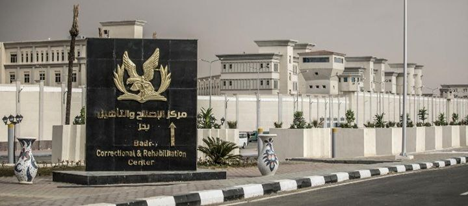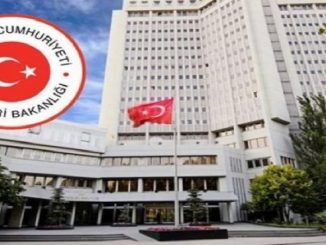
Human rights organizations say the United Nations must adopt a resolution on the dire human rights situation in Egypt.
Reactions have continued to the leaked message from prisoners at Badr-3 Prison, which highlighted the violations and intensified suffering of hundreds of detainees in Badr-3 Prison, which forced some detainees to commit suicide.
Human rights organizations have called on the UN to adopt a resolution on the worsening human rights crisis in Egypt following reports that some detainees have committed suicide as a result of their suffering in prison.
In an open letter, Egyptian and international civil society organizations have recently called on the UN Human Rights Council to adopt a resolution on the human rights crisis in Egypt, warning that repression and impunity in the country are deeply undermining efforts to address corruption, inequality, ecological destruction, and larger social injustices.
The signatories on the joint letter included: Amnesty International, Cairo Institute for Human Rights Studies, DIGNITY – Danish Institute against Torture, EuroMed Rights, and International Service for Human Rights.
The leaked message from Badr-3 Prison carrying the signature “Detainees of Badr Prison 3… Sectors 1, 2, 3, 4”, stated three suicide attempts in prison as a result of violations, in addition to a number of prisoners going on a hunger strike, most notably including Dr Mohamed Badie, the Muslim Brotherhood general guide.
The message said that detainees launched a hunger strike to protest several violations of their rights, including being denied family visits, exercise, healthcare, and proper meals. Riot police and security forces then stormed the rooms and put some of the detainees under disciplinary action.
“The government of Abdel Fattah al-Sisi prefers to silence criticism of its corrupt, iron-fisted rule rather than take serious steps to ensure real reform. This approach is leading Egypt toward disaster,” said Jeremie Smith, Director of the Geneva Office of the Cairo Institute for Human Rights Studies (CIHRS).
The human rights defender-led Till the Last Prisoner campaign expressed its “deep concern about the statement issued by the prisoners of Badr 3 Prison, which confirms prisoners are being subjected to systematic abuse and inhuman detention conditions which led them to attempt suicide.”
It called on the Public Prosecution and the National Council for Human Rights to investigate the incident and the ongoing violations inside the prison.
The regime has touted the new Badr prison complex, which holds many detainees formerly held at the notorious Scorpion Prison, as a model of humane treatment of prisoners, but inmates and their families have continued to document widespread abuses at the new facility.
Seven rights organizations a few days ago sent a letter to member and observer states of the UN Human Rights Council today urging them to “meaningfully address the on-going human rights crisis in Egypt” at the Council’s upcoming session.
The letter notes that the session, set to begin on February 27, marks two years since a group of 32 states delivered a joint statement at the Council voicing deep concern over Egypt’s human rights record.
“Since that time,” they write, “no consequential follow-up has occurred at the Council, despite the fact the human rights situation in Egypt has further deteriorated.”
While the previous joint statement had real impact, the signatories say, the Egyptian government ultimately “failed to implement almost all of the promises and commitments it has made concerning human rights reform within the country.”
They warn that repression and impunity in Egypt are deeply undermining efforts to address corruption, inequality, ecological destruction, and larger social injustices.
“To have real impact on the situation on the ground, Human Rights Council action must be sustained and strategic,” the organizations conclude.
“As was evidenced by the Egyptian government’s abusive tactics during COP27, a follow-up resolution, or at minimum a joint statement, by UN member states at the upcoming session is essential to meaningfully address the on-going human rights crisis in Egypt, and to send a clear message to the Government that the international community will continue to watch and respond to the situation as it develops.”
According to the Egyptian Network for Human Rights, ” the goal of the repressive measures is to inflict the greatest possible psychological and moral destruction on the detainees, which became clear after one of the detainees committed suicide, and others attempted suicide. They were transferred for treatment in the prison hospital. They did so to escape the continuous suffering for years without any limits.”
In a report titled “Limitless Systematic Psychological Destruction Inside Prisons” the organisation said that “suicide attempts are a natural and logical consequence of the catastrophe of the human rights file and the gross violations committed by the authorities, whether executive, represented by the Egyptian Ministry of Interior, the Public Prosecution or the judiciary. They all agree on violating the rights of detainees, and insisting on depriving them of the lowest standards of fair trials.”
Prisoners have been “completely cut off from their families and the outside world,” it added, which has worsened their mental state.
The organization called on everyone to “assume their constitutional, legal and humanitarian responsibilities, whether Egyptian officials or the international community, to stand together in the face of serious violations of the rights of prisoners, to unite efforts to save what can be saved, and to grant detainees the right to their legitimate rights under the constitution and the law, and an end to this catastrophic file that has been going on for years.”



